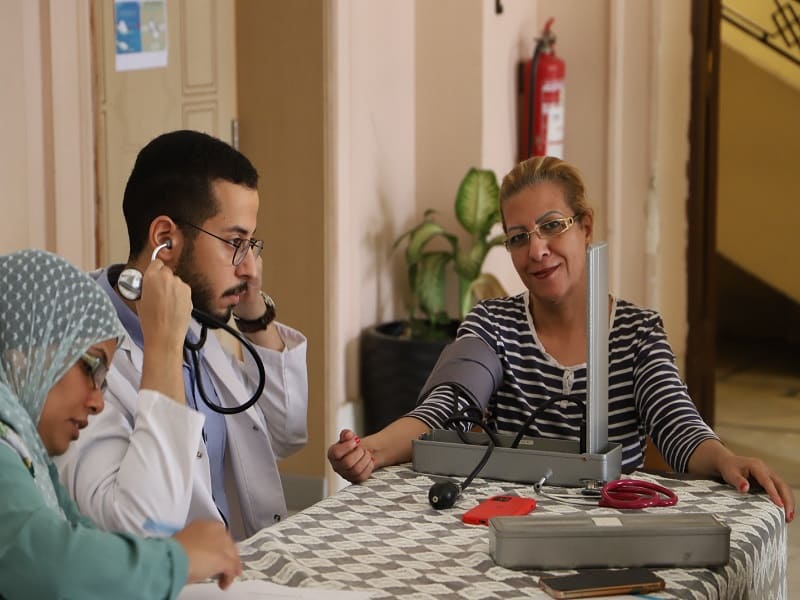Awareness symposium of celebration of World Hypertension Day at the Faculty of Medicine
Within the framework of the celebration of the Faculty of Medicine at Ain Shams University and university hospitals on World Hypertension Day, the Faculty of Medicine, in cooperation with the Community Service and Environmental Development Affairs Sector, organized an awareness seminar for the employees working in the faculty and the university, under the auspices of Prof. Ghada Farouk, Vice President for Community Service and Environmental Development, Prof. Ali Al-Anwar, Dean of the Faculty of Medicine and Chairman of the Board of Directors of University Hospitals, in the presence and supervision of Prof. Hala Sweed, Vice Dean for Community Service and Environmental Development Sector, and Prof. Khaled Draham, Professor at the Department of Cardiology and Prof. Adel Shabaneh, Professor at the Department of Cardiology, gave a lecture at the symposium.
Prof. Hala Sweed began the seminar, then she indicated, in her speech, that the World Health Organization celebrates every year on the 17th of May World Hypertension Day.
The symposium aims to introduce the disease of blood pressure and how to prevent it and coexist with it and the healthy habits that must be followed.
Prof. Khaled Draham started the symposium by introducing the definition of blood pressure disease, its symptoms, and how to measure blood pressure, as it has recently become available accurate electronic home pressure devices through which it is easy to measure pressure and follow it regularly (which is necessary for people over the age of forty), but it must be an approved device and there are different types of measuring devices the pressure.
He talked about the instructions used to measure blood pressure, the psychological state of the patient, and the behaviors that must be followed to prevent blood pressure disease.
Prof. Adel Shabaneh reviewed the necessity of lifestyle modification, which is one of the most important ways to prevent blood pressure disease, and reducing blood pressure is necessary to prevent heart attacks and brain strokes and reduce mortality rates, as well as the diet, including the DASH diet, which is a healthy, flexible and balanced food plan designed to help prevent high blood pressure and treat it.
The DASH eating plan is high in some nutrients such as fiber, potassium, calcium, and magnesium, all of which play a role in heart health and are lower than others in saturated and trans fats, added sugars, and sodium.
Drawing attention to the recommended daily intake of salt, the types of salt used, including Himalayan salt, its source, and the harm and health side effects that are associated with this salt, advising the attendees to adopt some correct household habits to reduce salt and the possibility of using herbs and salt substitutes to prevent the risk of developing blood pressure.
On the sidelines of the symposium, blood pressure was measured for the attendees for free.
.svg)




